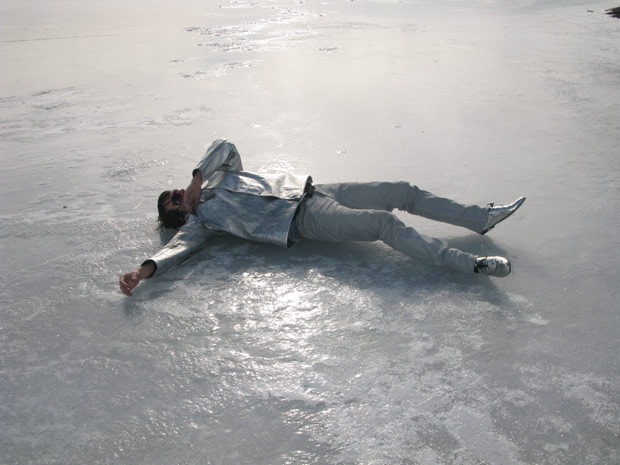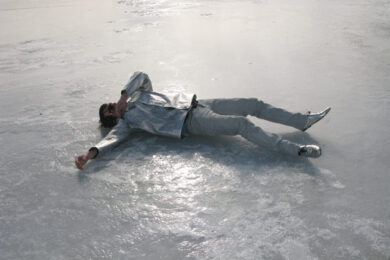With Britpop on its arse in 1997, two British bands who had always marched to the beat of their own drum released two of the best albums of the decade: seminal works of ethereal beauty that stuck out like sore thumbs amongst the bloated and self-satisfied regurgitations from Noel, Damon et al. While history may have Radiohead’s OK Computer pegged as the greatest album of the 90’s, the initial plaudits heaped upon Spiritualized’s Ladies and Gentlemen We Are Floating In Space were just as gushing – NME even gave it the number one gong in their Album of the Year Poll ahead of their po-faced Oxford contemporaries. A beautiful album full of crushing heartbreak, drug come downs and tantalising hopes of redemption, it still sounds as fresh today as it did 12 years ago.
Since then, a decade of drama has ensued for the space-rock heavyweights. After the release of Ladies and Gentlemen…, lead singer Jason Pierce (aka Jason Spaceman) sacked and replaced the band; in 2005, he suffered a near-death experience after contracting periorbital cellulitis with bilateral pneumonia (a period of time which would would inspire the band’s 2005 album Songs in A&E). But last year, while at the top of a mountain in Australia with Nick Cave and light-headed from the altitude, Spaceman agreed with festival organisation All Tomorrow’s Parties to play the entirety of Ladies and Gentleman live over a series of concerts. And 12 years after its original release, he gave the go-ahead for the re-release of arguably his finest ever work.
The Quietus caught up with Jason to find out how he feels about the album over a decade later, the chances of him going to space, and a possible sequel to Ladies and Gentlemen…
So, you’re about to reissue Ladies and Gentlemen We Are Floating In Space. How did that come about?
Jason Spaceman: Um . . . because all good things come in twelves, and this is the record’s twelfth anniversary. No, the long story is that we were sat on a mountain doing a show with Nick Cave in Australia, and it was six and a half thousand feet up so people were getting kind of woozy and dizzy. But it was beautiful, and we played the show up the last tiny bit of the slope, and the last 100 metres was where the audience were with this beautiful mountain range and sky behind. We sat up all night and the people who run ATP gently leaned on me to do one of these shows and somewhere in the middle of the next afternoon they asked if I would consider doing Ladies and Gentlemen, and I said ‘OK, OK’ – almost so I could just get some sleep.
And then on the back of that, Sony said ‘Well, let’s release the record’ – put it out again and do the pill packs and stuff. So, there you go. That’s the longer story.
What was it like going back and revisiting the record? Had you listened to it a lot in those 12 years?
JS: No, never. I left it as long as I could. I didn’t want to be sitting listening to it forever, so I left it until two weeks before the first show. I listened to it right through, because I had to actually do the record live, and I’d forgotten how big an undertaking it was.
One of the things that stikes me about Ladies and Gentlemen… is how fresh it still sounds.
JS: Maybe you just haven’t listened to it that much. But also, so much music is fashion-based, you know? ‘There’s this band that’s hip and selling; let’s make another band like it’. There’s a lot of pressure from people who want success, and people who want to be marketing success. And I’ve never been interested in that. It dates things fast – like ‘This music has flared trousers already’.
It’s seen as a seminal guitar album of the 90s. Obviously that must be flattering, but do all the platitudes heaped upon it ever get overwhelming?
JS: No, but it also doesn’t feel like my record anymore, which is good. People are moved by it – the shows we’ve done were amazing, absolutely mind-blowing, and people are almost counter-intuitive to what you do live. When you make a record you put the big songs at the front; when you play live you put the big songs at the end of the set because that’s when you’ve generated the most electricity. So these shows were kind of the antithesis of that, because you’re playing the more intimate songs when the room’s as electric as it’s going to be. But that’s countered by the fact that people bring their own connection with that album. People end up almost knowing how long the gaps are. You can play three seconds of the first chord of a particular song and they’re moved by it, because they know how that song makes them feel.
I always think records are like time-capsules or spaceships. You finish them and push them off and they start relating to other people. They’re not really my records any more, so because of that you have to get them absolutely right. You can’t recall them. You can’t say ‘We should have done that’ or ‘I could have written that better’. So many people . . . it’s the easiest medium, you know? It’s rock & roll, how much more fucking simple can it get? But people just don’t spend that tiny bit of time getting it right.
Has going back to that record had an influence on the music you’re writing at the moment – to make, say, a Ladies and Gentlemen… II?
JS: Not like it – not to go ‘Oh, let’s do that’. I’m not a big believer in backward steps, or thinking ‘Well, that worked then, let’s do it again’. But, I am making a record. And I’d be lying if . . . it’s very weird to lay out something you did 12 years ago in all its complexity and then get inside it enough to be able to play it live, and not have that get into some of the newer stuff we’re doing.
It’s different now, because Spiritualized as a band is so special, and everyone brings their own thing. When Kevin plays drums, I don’t think ‘Oh he’s playing drums’. I think ‘That’s Spiritualized’. When people put their parts to it, I don’t think it’s right or wrong – it’s just Spiritualized, it’s what we do. Great musicians work together by osmosis. It just kind of forms its own thing. And . . . it’s hard to make a record where I wilfully go back and say I’m going to put my own demos down and pursue my own singular goal.
So do the songs sound similar?
JS: It’s early days. We’ve put down some great, great songs. I think what [listening to] Ladies and Gentlemen… has done is raised the bar in a different way. Rather than just copying the sonics of that record and saying ‘How did we use to do it?’ or ‘We used to do it like this’, it’s raised the bar, and I think that’s good.
Do you mean that it’s giving you a marker to try and beat?
JS: I don’t know . . . no. I wish we’d never started this conversation now.
OK, let’s move on. There are a couple of demos on the reissue. What’s the story behind them?
JS: There were a couple of pieces, yeah. I was listening to a lot of people like John Adams . . . I’ve always seen these kind of threads within music, you can follow this thread to the MC5, and that one to Sun Ra, and then another one to the whole of jazz, and then blues, and then rock & roll, and rockabilly, and soul. In a weird way, Ladies and Gentlemen… – or maybe all of our records – are a way of taking them all in and tying the strings together. They probably weren’t on the album because they weren’t finished, but they still sounded great.
There’s always a danger with reissues that they’ll be padded out with loads of discarded demos, but the ones on the album work pretty well.
JS: Yeah. They’re not alien to it. It’s not like it’s a different sound world or anything, it’s all part of the same thread. It’s all part of the same atmosphere that you capture – there’s a bigger atmosphere than just a studio. People talk about Abbey Road having this kind of special air, this magic air. I think it’s pretty dirty there. I think the atmosphere of a record is more than they room you recorded it in.
You weren’t a fan of Abbey Road then?
JS: I was, but I didn’t fetishise the walls. It’s not a special place where you play a guitar note into the roof of the room and go ‘Listen to that’. It’s only as beautiful as the sound you put into it. It’s more than that. I want to put the whole of my life, and everything that’s going on at the time, into that little package.
It has the original version of the title track, too, with you singing Elvis’ ‘Can’t Help But Falling In Love’ at the end.
JS: I get a lot of people who ask after that track, so it’s not a bad thing to put it in. If I got permission at the time, that’s how you would have heard the track. At the time the people who owned the rights to the Elvis track said I could use it as I long as I gave them all the royalties, which I didn’t really care about – money wasn’t the issue – but they wanted it retitled as their track, so my track became a cover of their track. I’d put too much work into it just to say this is a cover of ‘Can’t Help But Falling In Love’. So I was kind of forced to go away and re-write. In a weird way, it was raising the bar again: ‘How are you going to do it now?’. And I think it became better.
So you don’t see this one as the definitive version?
JS: No, just people ask about it so much, so it’s not a bad thing to say this, with the demos, is like the mechanics of that record. I also edited the album down to make 70 minutes – it was important if we were going to put it in the pill packaging it was a round 70 minutes, and the original track allowed it to be 70 minutes. When I rewrote the track it was a bit shorter, so the album got about eight seconds of run out on it which is no big deal, but for all the work that went into it, I ended up with eight seconds of run out to make it to 70 minutes, instead of being 70 minutes dead.
A lot of the responses to Ladies and Gentlemen… focus on it being a break-up record, because of the ending of your relationship with Kate [Radley, the band’s former keyboard player]. Is that something you get bored of talking about?
JS: Well, I don’t talk about it.
OK. Is it something you get bored of being asked about?
JS: It just became one of those things, didn’t it? Sometimes even denying a story becomes a story. That becomes dull – when people keep quoting the same thing however you answer it. It’s a little bit like when Amazing Grace got tagged as a garage record, and people still talk about it as a garage record when it’s got ‘Oh Baby’, ‘Rated X’,’Lay It Down Slow’ and all these beautiful songs that have little to do with garage music. And I think that’s the bit which becomes dull.
Do you think there’s a relationship between suffering and your songwriting, though? It does seem an open wound of a record…
JS: You try and capture moments, you know? I’ve said all along that ‘Broken Heart’ was written before any break up. But you try and put these feelings down in a way that makes sense to people. Sometimes it’s not even a words thing, sometimes it’s just a musical thing. But…I end up just saying the same things.
Writing ‘I have a broken heart’ after having a broken heart would be a pretty trite thing to do. It wasn’t something that I would have dwelled upon. It negates it just to make it about one thing.
After the album was released, there were some contractual and financial disputes with the band that culminated in you having to replace them. Was that a frustrating time – knowing you’d released a great album but were hampered by internal bickering?
JS: Yes and no…I can’t remember. It didn’t really effect the record at the time. It was hard work making that record. The band…I’m kind of ferociously loyal as a person, I know the tag line is ‘Hire and Fire’ and I’m a despotic ruler of this band, but I’m kind of not. I got rid of one band. But I lived with them for two years on the road trying to sort it out, waiting for the dust to settle, hoping they’d see sense. You can’t suddenly turn off into a road named stardom and riches. It doesn’t work like that. Once you go down that road, you’re already faking it and doing something you shouldn’t do. I tried to make it work, but by the end of it, or even for the last year, if I went into the lounge of the bus, everyone would get up and leave. I spent a very, very lonely year.

That must have been pretty soul-destroying…
JS: It was devastating, you know? It was all about their power over me. They could make changes, they could decide what shows to do, where to take it. And we couldn’t be like that. We couldn’t work like that. And at the end of it, I took people’s advice and got rid of them, and it looked up from there on. But that wasn’t an easy thing to do – especially with Sean [Cook]. The other two came to it late and made some waves, but Sean was a close friend who I think truly believed this was the greatest rock & roll band in the world but got swept along with this could be the most famous band in the world, or the most successful.
Did you try to sort it out?
JS: Yeah. Before anything was made concrete, before trying to get them out of the band, I must have had countless conversations with him. Asking ‘What are you trying to do?’. ‘Why are you trying to destroy this?’. This list of demands, and what we could and couldn’t do…what’s the point? It’s not a fucking job. It’s what you do so you don’t have to get a fucking job.
The title of the record come’s from the novel Sophie’s World by Jostein Gaarder, and in particular the quote: "Only philosophers embark on this perilous expedition to the outermost reaches of language and existence. Some of them fall off, but others cling on desperately and yell at the people nestling deep in the snug softness, stuffing themselves with delicious food and drink. ‘Ladies and Gentlemen,’ they yell, ‘we are floating in space!’ But none of the people down there care". What significance did that have?
JS: Sometimes, even now, I read a book cover to cover and think it was a great book, and days later I can’t remember a single thing – the characters, what it was called even – but I might remember a single line that was really beautiful. And the only way to get that is to read the whole book. It’s a children’s book really, a basic history of philosophy. And when the magician pulls the rabbit out of the hat, most people want to snuggle down in the rabbit’s fur and ignore the horrible things, and then some people want to look the magician in the eye and say ‘We are floating in space’ – like it’s magical thing, look at it. That was the thing with Ladies and Gentlemen… – look how rich everything is, look what you can draw upon, look at what you can pull in. A lot has been made about Ladies and Gentlemen… being very introspective and maudlin, and at the depths of sorrow, but it’s kind of also the opposite. It’s like ‘Look at this fucking massive thing…look at the heavens’.
Before we finish, I was going to ask you a couple of questions about space. Weren’t you supposed to play the CERN collider at some point?
JS: Yeah, but by the time we got our act together it was full of metal objects moving around.
Is that something you want to do in the future?
JS: Didn’t they have to shut it down?
Yeah, a passing bird dropped a baguette into it.
JS: So strange…a baguette.
How about Virgin Atlantic? Would you like to do that? Not to play, obviously, but to go into space.
JS: Yeah, definitely.
What do you think it would be like?
JS: I don’t know. Expensive.
Final question. You spoke earlier about working on new material – when can we expect to hear that?
JS: Um…when it’s done. I can’t answer questions like that, when it’s done. But hopefully next year.t’s looking good, but you know when you’ve finished. We shall see.



